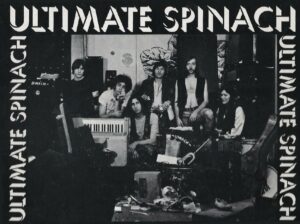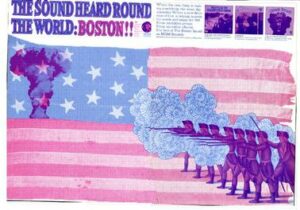By Sharon Oliver
Contributing Writer
BOSTON – Music aficionados can easily recognize the Motown Sound, the Sound of Philadelphia, Memphis Soul and so on and so forth, but the Bosstown Sound perhaps not so much.
It was conceived in the late 1960s by New York City-based record producer Alan Lorber who wanted to compete with the San Francisco Sound and give Boston-area psychedelic bands like Beacon Street Union and Orpheus some well-deserved national attention. Talent scouts visited cities, including Boston, looking for active music scenes with bands who appealed to college-age fans.
A target city for developing new artists
Local bands like Eden’s Children, Phluph, Ill Wind and Ultimate Spinach developed a small but devoted local following. As a matter of fact, during Ultimate Spinach’s short existence from 1967 to 1969, they managed to release three albums. People like Marq Jaqobs remember, “The first time I saw the Ultimate Spinach was at The Boston Tea Party with the Hallucinations, two amazing Boston bands. I also loved listening. So many great Boston bands. More should have become more well-known.” In 1967, a new venue called The Boston Tea Party started showcasing musicians who performed underground and psychedelic rock bands, but this would soon prove to be not enough.

Lorber wanted to make Boston “a target city for the development of new artists from one geographical location.” Unfortunately, the hype of this psychedelic rock was no match for similar music coming out of San Francisco since West Coast-bands like Jefferson Airplane dominated the airways and music charts. Still, there was an effort. WTBS DJ Tom “Uncle T” Gamache was one of the first to broadcast progressive and underground/psychedelic rock. Gamache particularly liked The Hallucinations, whose front vocalist Peter Wolf would later join The J. Geils Band.
Part of the problem was that the styles of the various artists made it difficult to describe the music. In a 1968 interview with Record World, members of The Beacon Street Union described their dislike of “being lumped in with a lot of other people as part of the Boston Sound. We want to be ourselves.”
Panned by critics
Critics were also quick to pan the Bosstown Sound and the bands behind them. In 1968, the New York Times’ Robert Shelton wrote that while some of the bands were talented and capable of finding some success, the music was “mostly [record company] puff. Jon Landau of Rolling Stone was even harsher. In a 1968 article entitled “The Sound of Boston,” he called The Beacon Street Union “inept,” Orpheus, “shlock,” and Ultimate Spinach “pretentious.” Music critic Richie Unterberger dismissed that era of work as “poor third cousins to the West Coast psychedelic groups that served as their obvious inspirations.”
MGM Records, ABC Records and Elektra Records signed a few bands to their label in an attempt to foster a sense of cohesion among area bands. MGM Records even launched an advertising campaign by funding a patriotic-style ad in Billboard magazine that read: “The Sound Heard Around the World; Boston!!” but the Bosstown Sound faltered by the end of 1969 and all the hype died down.

The Bosstown Sound was not the idea of any local band and not everyone loathed Boston bands’ psychedelic rock. One article in Newsweek tried to present a defense, stating a sense of unity was found in “subdued, artful electronic sound, an insistence on clear, understandable lyrics, the spice of dissonance and the infusion of classical textures.”
Nevertheless, Boston bands like Aerosmith, Boston, the J. Geils Band, The Cars, New Edition and New Kids on the Block would later emerge with their own style of rock, pop and R&B, catapulting them into superstardom and placing the city high on the map when it comes to producing musical talent.
RELATED CONTENT:
Boston Tea Party concert venue featured iconic 1960s rock bands
The riot that got Led Zeppelin banned from Boston
Janis Joplin’s last concert was in Boston












